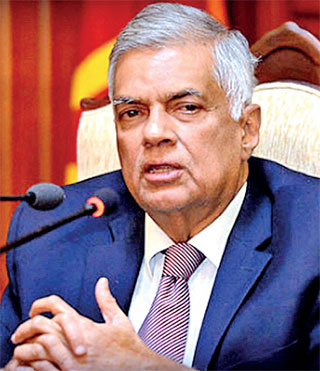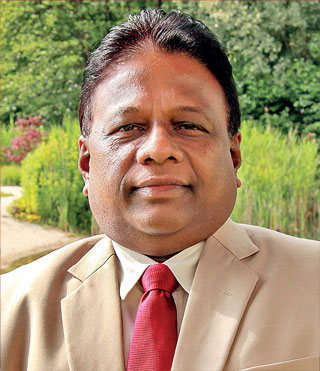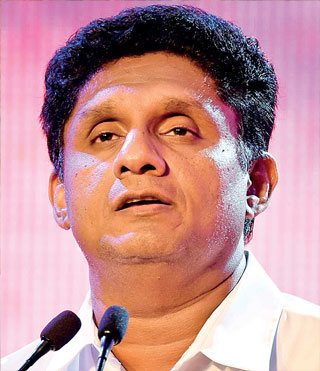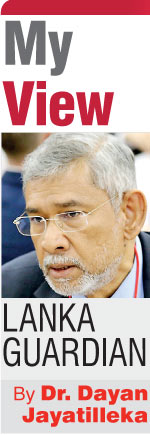Tuesday Feb 17, 2026
Tuesday Feb 17, 2026
Thursday, 21 July 2022 01:20 - - {{hitsCtrl.values.hits}}

Ranil Wickremesinghe

Dullas Allahapperuma

Sajith Premadasa
|
 At the time of submitting this column to the Editor by my regular deadline, Wednesday morning, I do not know who you are, but believe me that doesn’t matter either way. If you are ex-PM and currently Acting President Ranil Wickremesinghe, it won’t matter because what I write will be irrelevant. That’s because, as President Biden definitively said, the difference between democracy and autocracy is that in a democracy the people elect their leaders. You will be the first ever leader we have had as an independent country, who has no popular mandate whatsoever. By Joe Biden’s yardstick you will be a dictator, not a democrat, and Sri Lanka will no longer be classifiable as a democracy, however illiberal; it will be a dictatorship.
At the time of submitting this column to the Editor by my regular deadline, Wednesday morning, I do not know who you are, but believe me that doesn’t matter either way. If you are ex-PM and currently Acting President Ranil Wickremesinghe, it won’t matter because what I write will be irrelevant. That’s because, as President Biden definitively said, the difference between democracy and autocracy is that in a democracy the people elect their leaders. You will be the first ever leader we have had as an independent country, who has no popular mandate whatsoever. By Joe Biden’s yardstick you will be a dictator, not a democrat, and Sri Lanka will no longer be classifiable as a democracy, however illiberal; it will be a dictatorship.
An Aragalaya which overthrew an autocratic leader elected by 6.9 million people is unlikely to do anything other than revolt against your rule. Knowing you, that will lead to an exceptionally bloody repression through which you will not prevail. Civil conflict, perhaps escalating to the level of civil war will destroy this nation. So, if it is you, Ranil, who has won the Presidential stakes, you can stop reading this column at this point.
However, at the time of writing, Sajith Premadasa has made that rarest of moves for a Sri Lankan political leader. After his dialogues with the Aragalaya delegation and Dullas Allahapperuma, Sajith pulled out of the Presidential race and proposed Dullas as candidate. He behaved like a statesman, putting his country’s interest above that of his ego and narrow party-political brand/identity.
As I write, UNP and Pohottuwa chatter hopes that with Sajith opting out, the SJB will pivot to their old boss Ranil, and with Sajith backing Dullas, the SLPP will recoil as a bloc and also pivot to Ranil.
If, however, as I think is likelier, the President is Dullas Alahapperuma and the PM is Sajith Premadasa, then they should read this memorandum, because what I’m writing is valid for and intended for both. It is also practicable by either one and should be practiced together, by both.
Duumvirate
Sajith and Dullas, I guess I’ll be referring to you rather more formally soon enough and not by your first names that often. You are the two best democratic political figures in the country at this fraught moment, this hinge-point in its history. We are fortunate to have you. Each of you represents the most progressive, democratic and advanced expressions of your respective political camps and traditions. Potentially you could generate the most progressive, advanced political fusion or synthesis we have seen since Independence. You represent a generational shift and are only a few years apart. You are our last best chance.
Having known you both, I know that you are more similar than you may think—I mean that as a compliment—and you are certainly far more compatible politically than Ranil Wickremesinghe and Maithripala Sirisena (or Ranil and Chandrika) were. You are both modernists, progressive centrists and pluralist patriots. Deracinated elitists may call you ‘populists’, and if you are, you are both progressive populists (in the Latin American sense). I’d say you are both proto-social democrats and may be evaluated internationally someday as social democrats, if you live up to your fullest potential.
Sajith, having worked closely with President Premadasa I am sure he’d approve of your decision. He made a similar one in April 1973, when he pulled back his Puravesi Peramuna (Citizens’ Front) which had gained traction for over a year.
Each of you will need the other to repair Sri Lanka and make it work again, or if you prefer your images more organic, to resuscitate and heal Sri Lanka, make it whole again.
Remember what President Barack Obama, a professor of Constitutional Law, told the graduating class of West Point, the most prestigious US military academy: “Don’t do stupid stuff”. Don’t let extremist spoilers in your respective camps do stupid stuff either.
Your joint media conference was an excellent new beginning. The big mistake your parties can make is to think that only your side can take us out of this crisis. Neither of you nor your parties can go it alone. You have to work together as partners if this place is to function at all. You simply must avoid the errors of sectarian political partisanship e.g., Yahapalanaya 2015-2019 and the CBK-Ranil cohabitation of 2001-2003.
Your Cabinet must be meritocratic in that the best possible brains and talents must be assembled; it must be balanced, as between centre-right and centre-left; and a rainbow coalition in terms of ethnicity, religion, gender, generation and ideology.
The two of you have to save Sri Lanka. Your dialogue and relationship with each other are going to be more important, more decisive, than your relationships with those in your respective parties and political camps.
The two of you must establish and nurture a partnership, a relationship, an equation. Your equation with each other is what is going to make your policies work, and those policies have to be discussed with each other in order to get off the ground. You must not be ‘siloed’ within your political camps. You must be a duo; a ‘duumvirate’.
The Government and Cabinet you preside over must ideally be an all-parties or pluri-party emergency government of national concentration. It can be a transitional administration but cannot be an ‘interim government’; it’ll take the rest of the term/s (2024/5) to restore and relaunch the economy. Your new cross-party compact must have its own reform project, not merely that of nightwatchman until an island-wide politico-electoral battle in a few months blows-up consensus, diverts focus from an economy on life-support and kills it off.
Please do not waste your time and that of the country by engaging in a tug-of-war over policies or turf. Just go with what you can get the other’s concurrence for.
|
Avoid constitutional quagmire
You have to cut through the Gordian Knot on many issues. It’s Gordian Knots all along the way.
Don’t get trapped in the quagmire of Constitutions. Stick to the best deal that can be arrived at in the shortest possible time. Sajith, please don’t try to bring back the issue of the abolition of the Executive Presidency; you just don’t have the numbers in Parliament.
The Aragalaya wants to abolish the executive Presidency but that can be done if ever the Parliament produces a two-thirds majority for it, and the parties supporting it can try their luck at a parliamentary election. Now is not the time to divert the nation’s attention.
Anyway, this is certainly not the time to abolish the executive Presidency –not with a deep economic crisis to climb out of. Learn from the situation in the British parliament. Any such political volatility here would sink this economy right into the sea-bed. Learn also the contrasting situation of France: be it the ‘yellow vests’ protests of a few years ago or the loss of a governmental majority in the National Assembly, there is stability of the State, thanks to the nationally and directly elected French presidential system.
If a referendum is held within a year on a new Constitution which abolishes the executive presidential system, you would both be walking into a deadly trap.
While the famous old saying is that “patriotism is the last refuge of the scoundrel”, my father, Mervyn de Silva amended that to read “in Ceylon, chauvinism is the first refuge of the defeated politician”. The issue of a political system minus an overarching executive presidency, but retaining if not expanding the devolution of power to the provinces, will provide the Sinhala militarist-racists and religious chauvinists a chance to regroup, mobilise and campaign on. 97% of the people were against Gotabaya and only 3% for his administration, but that will not be the line-up at a referendum on a new Constitution now that the Rajapaksas don’t rule anymore.
Wijeyadasa Rajapakshe’s original 21A draft—the one before Gotabaya watered it down—should be immediately implemented, subject to those improvements suggested by the various Opposition parties and the Aragalaya Charter, that can secure a two-thirds majority without a long, lacerating debate. Once the Constitution is rapidly amended, reformed, repaired and renovated, just move on.
As for a People’s Council, have someone give you a report on the Economic and Social Council of France, constitutionally established by General Charles de Gaulle.
|
New Middle Path
You should renounce zero-sum games and prevent your parties from playing them. Dullas, you emphasised ‘Sammuthiya’ (Consensus) and Sajith, you stressed ‘Sahabagithvaya’ (Participation) at your joint presser. You were both correct. The famous 3Cs formula of President Ranasinghe Premadasa: ‘Consultation-Compromise-Consensus’ is the key.
The crisis needs the broadest-based Government possible to stabilise the situation. The System needs balance; equilibrium, not deadlock. That requires permanent contact and conversation at the top, co-management of the crisis, and speedy joint intervention.
Don’t try to score points for yourself or your respective side. Forget the old polarisations. The people will electorally reward the leader/leaders and the parties they see acting most responsibly in the public and national interest during this crisis.
There are errors, there are blunders, there are follies. In the enormous crisis that we are in, every error becomes a blunder, and every blunder, a folly. Here’s the biggest folly you can commit:
There are five ideas out there in the polity and society, each of which has some truth, some merit, but if they are put together as a cocktail, there will be chain-reaction of explosions, an implosive collapse or a military coup. These ideas are:
(1) The abolition of the executive presidency, instead of its democratising structural reform.
(2) ‘Deep’ i.e., brutal austerity; unbalanced, unilateral economic reforms consisting of ‘bitter medicine’ and ‘shock therapy’; total privatisation-marketisation-foreignisation; liquidating the state’s role in the economy.
(3) Going beyond full implementation of 13A i.e., beyond regional/provincial autonomy within a unitary state framework.
(4) Permitting foreign judges, Prosecuting Counsel and investigators in an accountability mechanism on Sri Lankan soil.
(5) Abolishing Proportional Representation.
You do any two of those together there will be volatility. Any three, turmoil. All four, explosion. All five, and you will qualify for Fidel Castro’s post-mortem on the Soviet superpower state: “suicide, not homicide”.
Dullas and Sajith, in all things be guided by the Delphic Oracle’s carved exhortation “nothing in excess”; tread the Buddha’s Middle Path; seek Aristotle’s Golden Mean. It is not always easy to discern these. But never, ever, confuse these with a recommendation to go slow. In this crisis and the subsequent drive to recovery and catch-up development, you can and must move on the Middle Path as if it were a Grand Prix race-track.
|
Economics
In the domain of Economics, you are lucky because there is a wealth of talent to draw on, and I don’t mean only for the post of Finance Minister. We also need a Minister of Policy Planning and Implementation—a portfolio that was held by President Premadasa. We could do with a Minister of External Trade. All economic and developmental ministries should be clustered.
The leader who inherited an economy stricken by two civil wars, North and South, turned things around and relaunched the economy to new levels of achievement from which we still reaping benefits was President Premadasa. What is crucial is to understand the secret of Premadasa’s success. That secret was his alternative paradigm of political economy.
During Sri Lanka’s grave foreign exchange crisis magnified by the oil price hike in the 1970s, Premadasa as youthful Opposition MP already had an unorthodox take:
“…To earn foreign exchange, we must increase production; to increase production we must develop our national resources, and if we are to develop our national resources, we must harness the human potential that we have in abundance.” (People’s Participation in Government, April 4th 1973, republished Ceylon Daily News, Nov. 21, 1991.)
Premadasa had a basic principle which guided his priorities: the people and the people’s needs get topmost priority:
“Minimal solutions to many, rather than high standards for a few, will be our vision for the immediate future.”
(President Premadasa, Learning, Unlearning and Re-learning, 9.12.90)
“The base of our country is the common people. If half of that base is in dire poverty and degradation, doesn’t that amount to the sinking of half the foundation of the building? Isn’t it a surprise that those walls are cracking when the foundation is sinking? Isn’t it what has happened to our country? Therefore, what we should do is to strengthen the base. In other words, we must help the poor people to live. We must assist them to participate in making this country prosperous.”
(President Premadasa, His Vision and Mission, Selected Speeches, p15)
Foreign policy: ‘New Nonalignment’
The two competing political camps in Sri Lanka go to opposite extremes. One camp, the SLFP in MR’s 2nd term and then the SLPP, isolated Sri Lanka from one hemisphere of the world and played fast-and-loose with the other hemisphere. The other camp, the UNP, went along with one part of the world and alienated domestic public opinion to the point of political untenability.
Foreign policy is about external relationships; establishing, broadening, diversifying, managing and balancing external relationships. Our foreign policy and diplomacy have to be active and independent—not passive, dependent or autarchic—while always being intelligently calibrated.
It is a fallacy that foreign policy should derive from or be subject to economics. Vietnam’s markets are in the West but it didn’t vote with it or even abstain but voted against the West’s UN resolution (which was carried) to suspend Russia from the UN Human Rights Council.
In 1971, Madam Bandaranaike obtained military support from the most diverse array of states not because we had good military relations with them but because we had good relations –overall—with them, which translated into military assistance when that was the need. So also, with economics. If we maintain and expand our relationships to all dimensions, around all points of the compass, our economic relations will multiply and be enhanced.
Sri Lanka be aware of the new dynamics in world affairs. States of Asia, Eurasia and the Global South are increasingly demonstrating a renewed autonomy; a refusal to be drawn into the New Cold War (which has turned hot in Ukraine) between the ‘collective West’ on the one hand and Russia and China on the other; a refusal to accept the definitions of either side and/or line-up with either side. Most of humanity maintains relations with all, on the basis of each country’s enlightened national and strategic interest.
Under your joint leadership, Dullas and Sajith, Sri Lanka must play its part in the newly emergent space which former Foreign Secretary of India, Shivshankar Menon has recently called “The New Non-Alignment” (Russia’s War in Ukraine May Bring Nonalignment Back (foreignpolicy.com). His view is supported by James Traub, columnist at Foreign Policy magazine (What’s Behind the New Nonalignment Movement (foreignpolicy.com)). The growing new Nonaligned space, which decidedly includes South Asia, is our home.